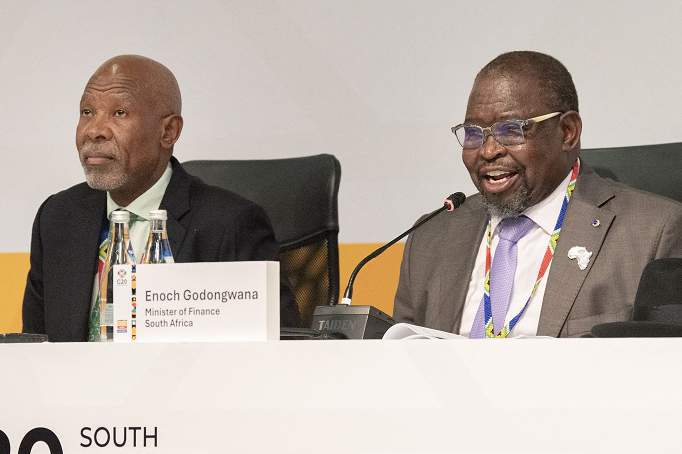
SARB Governor Lesetja Kganyago (L) and Finance Minister Enoch Godongwana. The finance minister said in a parliamentary reply that there was no intention to nationalise the SARB.
Rodger Bosch/AFP
South Africa’s Reserve Bank will not be nationalised.Finance Minister Enoch Godongwana made it clear that there were no such considerations.He was responding to a written parliamentary question from an EFF MP.Finance Minister Enoch Godongwana has emphatically rejected the idea of nationalising the SA Reserve Bank (SARB).
Since its inception,the EFF has called for the nationalisation of the central bank and other strategic state apparatus.
To achieve this,the EFF has a bill before Parliament.
Responding to a written parliamentary question from EFF chief whip Nontando Nolutshungu,Godongwana said there was no intention to nationalise the SARB.
ADVERTISEMENT
“Whilst 100% ownership of the SA Reserve Bank by the state would be in line with most countries and jurisdictions across the world,the benefit that would be derived from nationalising the SA Reserve Bank needs to be balanced against the likely large fiscal cost that would accompany it,” Godongwana said.
READ | Parliament to revive Malema's bill on nationalising the Reserve Bank
EFF leader Julius Malema introduced a private members’ bill to the sixth Parliament,but it lapsed along with dozens of others that could not be processed before Parliament dissolved for the May general elections.
Parliament’s Rules Committee and the Speaker of Parliament,Thoko Didiza,recently decided to revive all the bills that had not been considered.
ADVERTISEMENT
The bill was tabled in 2018,and a first round of public hearings was held in November 2018. The call to nationalise the SARB,which is owned by private shareholders,is a perennial one in both the ANC and its allies,and the EFF.
The ANC passed a conference resolution to nationalise the bank in 2017.
But there has been no appetite for nationalisation - neither from the Ministry of Finance nor other top leaders in President Cyril Ramaphosa’s administration.
However,Ramaphosa previously said the resolution would be implemented.
The Reserve Bank is unusual but not unique among central banks in terms of having private shareholders.
Godongwana said the costs to nationalise the bank would include compensation in terms of both Section 25 of the Constitution and existing bilateral investment treaties.
He said:
Yet the benefits of 100% ownership of the SA Reserve Bank are minimal,as private shareholders are currently restricted to playing a governance role only,and play no role in determining monetary,prudential,regulatory or any other policy,as policy issues are the sole responsibility of the governor and deputy governors of the SA Reserve Bank,all of whom are appointed by the president.
Opponents of nationalisation have argued that the board does not influence monetary policy decisions due to the constitutional guarantee of the central bank’s independence.
“What is more fundamental for the SA Reserve Bank is for the country to ensure that it is allowed to independently pursue its constitutionally enshrined mandate of protecting the value of the currency in the interest of balanced and sustainable economic growth in the republic; and its additional objective of protecting and maintaining financial stability as envisaged in the Financial Sector Regulation Act,” Godongwana said.
United News - unews.co.za